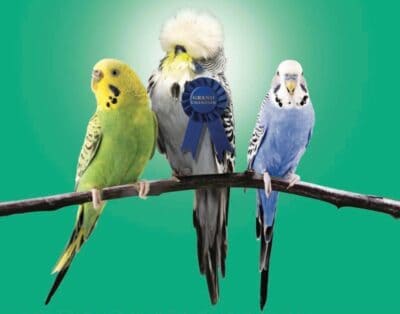Australian National Budgerigar Council
Budgie Breeds
Exploring Budgie Breeds: Unveiling the Diversity of Budgerigars
Budgerigars, or budgies as they’re commonly known, are loved worldwide for their vibrant colors, charming personalities, and melodic songs. But did you know that there are different budgie breeds, or more accurately, varieties? Each breed offers unique characteristics that make these small parrots even more fascinating. Join us as we explore the world of budgerigar breeds and this unique species.
Understanding Budgie Breeds
All budgerigars belong to the same species, Melopsittacus undulatus. To that end, there are two main types recognised based on their size and physical characteristics: the Australia Wild or Bush Budgie (or Parakeet), and the English Budgie. Interestingly, they are the same bird, derived from the same wild budgerigar, but through selective breeding, the “English” budgerigar has been bred for exhibition traits.

Australian Bush Budgie (Shell Parakeets)
Australian Bush Budgies, often referred to simply as Shell Parakeets in the United States, are typically smaller than their English counterparts. For example, they have a slender body and a pointed tail, giving them a streamlined appearance. Undoubtedly, these budgies are known for their playful and lively personalities, and they come in a wide range of colors and patterns.
English Budgie
English Budgies, often seen in bird shows, are larger and have a more distinguished appearance. As mentioned, they are selectively bred for exhibition traits to a Standard of Excellence, much like thoroughbred or dressage horses. They have fuller feathering around the face. Despite their stern looks, English Budgies are generally calm and gentle, making them great companions. The term English Budgie comes from the importation of the birds way back in the 1840s, when Gould brought them to the UK.
Since importing budgies was difficult during the ensuing Wars, the English bred within their existing budgerigar population, thus effectively creating a closed off colony of the species. What emerged was big bodies, fluffy plumage, and what large heads that set them apart from their wild Australian ancestors. Exhibition budgerigar fans all over the world are enamoured with English Budgies for their vivid plumage and refined form in line with the Standard.
Color Variations in Budgie Breeds
Budgies come in a variety of colors and patterns, known as mutations, which are common to both Australian and English style breeds. Some popular mutations include:
- Normal (Wild Type): Bright green body with black markings.
- Lutino: A yellow budgie with red eyes.
- Albino: A white budgie with red eyes.
- Blue: Budgies with blue body color.
- Pied: Budgies that have irregular patches of two or more colors across the body and wings.
Conclusion: Discovering the Diversity in Budgie Breeds
While the term “budgie breeds” may suggest a vast array of types, the primary difference comes down to the Australian wild or heritage style budgie, versus the exhibition refined English variations. To that end, these birds have a common ancestor. The delightful array of color mutations adds to their diversity, making each budgie unique. Understanding these types and their distinct traits can help you find the perfect feathered companion to match your lifestyle and preferences.
Contact Us
If you have more questions about budgie breeds or need advice on budgie care, don’t hesitate to reach out to us. Our members are always willing to help. Want to learn more? Why not check out our Facebook group?
